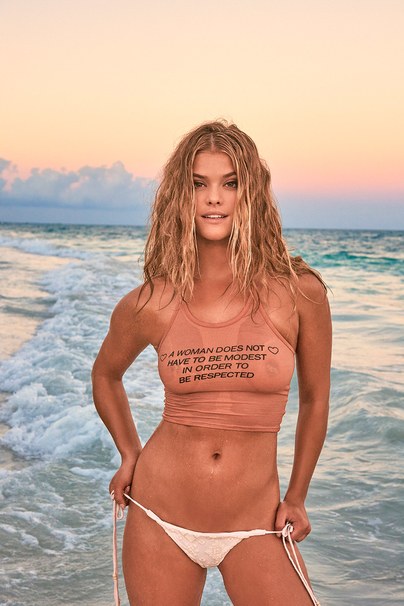3 Cheers for Capitalism: #MeToo Swimsuits, Girl Scout Cookies at Pot Shops, and Jimmy Buffett Not Begging For Food
If you ever wondered why free enterprise and capitalism triumphed over command economies and communism, I've got some answers right here.

Last fall, Katherine Mangu-Ward and I participated in a widely attended and watched debate about "capitalism" with the socialist editors of Jacobin magazine (you can watch it right here and you can listen as a podcast). Actually, to be fully accurate, I should say the Jacobin folks thought we were debating late capitalism.
That's the preferred term to describe what the hard left believes are the final days of private property, free enterprise, wage labor, and all the epiphenomena related to what Marx called capitalism. I first encountered late capitalism (the phrase, not the supposed objective reality) when I started graduate school for literary studies in 1988. Almost everyone assumed that the Cold War would be resolved in favor of the Soviets and communism. When that turned out to be way off, many academics switched to using advanced capitalism, which got most of the opprobrium across without betraying too much teleological optimism.
When the Great Recession hit, late capitalism came back into vogue. Finally, markets and economies were collapsing all around the globe, comrades! And yet…here we are, a decade or so later and capitalism is still doing pretty well. To be sure, it's nowhere near perfect, but what economic historian (and Reason contributing editor) Deirdre McCloskey calls "the Great Enrichment" proceeds apace, with fewer and fewer people living in what the U.N. calls "extreme poverty." As everyone except Pope Francis will tell you, that's because of free-er trade and more (not fewer) markets. As Ronald Bailey has documented, higher levels of economic freedom correlate strongly with longer lives, less disease, better environmental indicators, and even higher rates of life satisfaction.
Communists, socialists, progressives, and critics ranging from Fredric Jameson to Bernie Sanders to Thomas Frank to Naomi Klein to Hans Magnus Enzenberger continue to marvel at and grouse about the ways in which capitalism "absorbs" economic and philosophical challenges, "commodifies" them, and then keeps on truckin'. Capitalism's genius, it turns out, is a form of repressive tolerance that, as economist Joseph Schumpeter observed, brought more and more stuff to more and more people. "The capitalist achievement," he wrote, "does not typically consist in providing more silk stockings for queens but in bringing them within reach of factory girls."
Or, to put it in slightly different terms, capitalism allows more people to express themselves through work and live relatively high on the hog. Which brings to me three examples torn from today's headlines that show why capitalism persists—and why that's not a bad thing at all.
1. Sports Illustrated's #MeToo Swimsuit issue. What do you do with a classically sexist excresence of capitalism such as Sports Illustrated's annual "swimsuit issue" in an era of heightened sensitivity? You commodify your dissent ("SI swimsuit models celebrate more than just their bodies"), even if that means devoting pages to women wearing no bathing suits at all:
2. "Girl Scout sells 300 boxes of cookies outside pot dispensary." Well, of course she did! The nine-year-old entrepreneur, who isn't being named, sold about 50 boxes an hour by showing up outside a San Diego pot store, according to her father. And to its credit, the Girl Scouts organization is cool with it all.

FFS, even communists are getting with the program: Young Pioneer Tours, a company that takes its name from (mandatory) youth groups in Russia, China, Cuba, and elsewhere, markets its trips to the former Soviet Union, North Korea, and elsewhere as "group tours for people who hate groups."

3. Awful musician Jimmy Buffett is not only not living hand-to-mouth, but is insanely wealthy. If you're lucky, you only know one song by the bard of "parrotheads," 1977's ode to alcoholism, "Margaritaville." Better yet, you know no songs by Buffett, whom, as Eric Cartman observes in a South Park episode, "nobody likes…except frat boys and alcoholic chicks from the South." As The New York Times reports, though, Buffett is worth around $550 million and presides over a growing empire of bars and casinos, has a Broadway show based on his music, and owns more houses than he can keep track of (though it goes unmentioned, Buffett is also a prolific author). Under what other economic system could something like this happen without pillage and plunder? Although I call him an "awful musician" (hey, I've listened to Last Mango in Paris) one of the things that is great about capitalism is that my tastes (or yours, for that matter) don't get to dictate anything other than what I consume. Capitalism is the application of classical liberal principles to economics, so pluralism and diversity are the rule, not the exception. People who like Jimmy Buffett can dine at Margaritaville restaurants, catch his show on Broadway, and read his books. And the rest of can avoid him like the plague. That's an outcome all of us should be able and willing to live with.
So three cheers for capitalism, which enables free expression, social and commercial innovation, and generally rising standards of living. It's not perfect, but it beats the alternatives.


Show Comments (53)